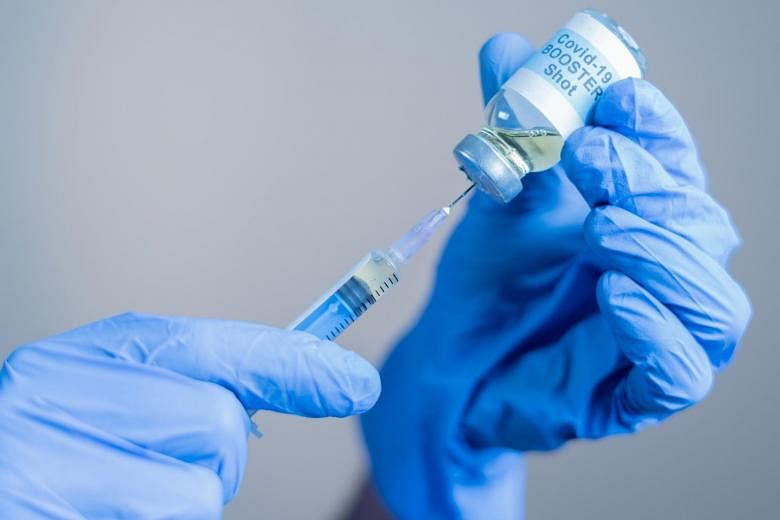SINGAPORE - Planning to get your booster shot against Covid-19 and wondering whether to mix vaccines?
On Monday (Nov 8), the Ministry of Health's director of medical services Kenneth Mak assured the public that taking a different mRNA vaccine as a booster shot is "perfectly safe".
Associate Professor Mak revealed that he had taken the Moderna vaccine for his booster jab to add to his two doses of the Pfizer BioNTech/Comirnaty vaccine, partly out of convenience. At the same multi-ministerial task force on Covid-19 press conference, Health Minister Ong Ye Kung said he, too, had taken Moderna as a booster after earlier Pfizer BioNTech/Comirnaty jabs.
Business development executive Cheryl Low, 32, chose Moderna as a booster after her Pfizer shots because she had heard that the former vaccine had a higher efficacy rate.
She says the fever and body ache that she had for two days after taking the Moderna booster were similar to the side effects after her second Pfizer dose.
A study in the United States had found that taking Moderna as a booster resulted in higher levels of antibodies, which is one indication of greater protection.
In the US, people eligible for boosters can get a dose of any approved Covid-19 vaccine, regardless of the one they first received. This means they can get a booster shot of Pfizer, Moderna or Johnson & Johnson.
The study by the National Institutes of Health (NIH), which is preliminary and yet to be peer-reviewed, evaluated how 458 people vaccinated with Moderna, Pfizer or Johnson & Johnson reacted to a booster dose of the same shot or a new one.
Those who had taken the Moderna vaccine for the first two doses and the Moderna booster were found to have the highest antibody levels. Those who got two doses of Pfizer, followed by a Moderna booster, had the second highest antibody count. Next were those who got two doses of Moderna, followed by a Pfizer booster.
But Singapore doctors tell The Straits Times that there is little difference in choosing either mRNA vaccine - Moderna and Pfizer BioNTech/Comirnaty - as both have comparable efficacy as boosters.
Citing the NIH study, Dr Alvin Neo, head of clinical projects at clinic chain Northeast Medical Group, says there is evidence of comparable efficacy and immunogenicity with either Pfizer BioNTech/Comirnaty and Moderna vaccines as boosters.
Immunogenicity refers to the ability of cells or tissues to produce an immune response.
Dr Neo says: "The increase in immune response with the different mRNA vaccines is not very significant and may not represent a significant incremental protection rate."
He adds that it is probably more prudent to get the most readily available approved vaccination as soon as possible to maximise protection.
Dr Leong Choon Kit, a family physician at Mission Medical Clinic, says: "The fact is both the mRNA vaccines work well as boosters and can be used in any combination."
Other than those who choose to mix mRNA vaccines, some opt for a non-mRNA vaccine like Sinovac or Sinopharm as a booster as they had undesirable side effects from mRNA inoculations.
Massage therapist Kenneth Loh took a Sinovac booster after he had fever and diarrhoea for a few days after his second Moderna jab.
Says the 35-year-old: "I did not want to go through the same experience and thought I should take a less potent jab to be cautious."
He experienced only a sore arm from the booster jab.
But Dr William Tan, a resident doctor at Doctors Express Medical Clinic at Raffles Place, says that if a person has had an mRNA vaccine, it is recommended that he continues with an mRNA type vaccine for the booster shot.
The exception is people who have myocarditis (heart inflammation) or a history of high-risk allergic reactions such as difficulty in breathing, he adds. "A non-mRNA vaccine such as Sinovac will be the alternative," he notes.
Associate Professor Hsu Li Yang, an infectious diseases expert at the National University of Singapore Saw Swee Hock School of Public Health, says there are no published studies on the effect of using Sinovac or Sinopharm as a booster after mRNA vaccination.
He believes doing so will give the immune system a boost against Covid-19, but adds: "Although I suspect that, in general, the levels of antibodies post-booster may not be as high as if the individuals had received an mRNA vaccine as a booster."
On whether one should play it safe and stick to the same vaccine for one's booster jab, Prof Hsu says: "We have more than sufficient evidence of safety for the booster shots. And while adverse effects such as arm pain, fatigue and fever are to be expected, it is more a personal preference as to whether one should stick to the same vaccine or switch to a different one."












